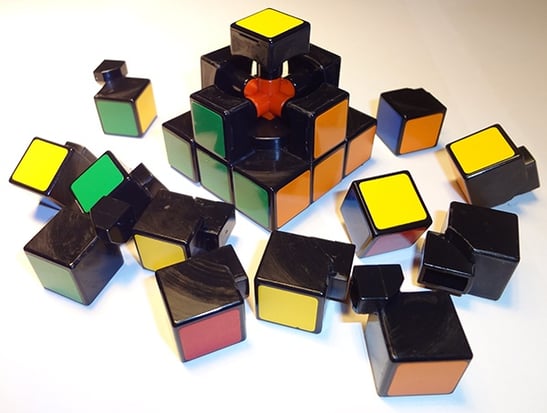
The reading sections of the SAT and ACT can be intimidating at first glance if you’re more inclined towards math and science than the humanities. All those passages! The horror!
Fear not, my number-loving friend. The reading sections of these tests are actually more logic and evidence-based than you might expect. In some cases, your science and math skills can even help you find the correct answers.
This article details three strategies for approaching SAT and ACT Reading if you consider yourself a more math and science-oriented student.
Strategy 1: Understand the Fundamental Rule
It’s crucial that you understand the one fundamental rule of SAT and ACT Reading before you take either test as a self-described "science and math person".
This rule is that there is only one unambiguously correct answer for every question, and you will be able to find direct evidence in the passage leading to elimination of all other choices. Eliminating answer choices should be a key aspect of your overall strategy.
If even one small part of an answer choice doesn’t fit, you have to get rid of it! If you do this right, you should be left with only the correct answer every time. As someone who is more math and science oriented, it may actually be easier for you to eliminate answers that don't line up with evidence in the passage.
On the SAT and ACT, you'll never have to do any deep literary analysis of any of the passages. Your approach to the reading sections should be different from the way you approach reading in your English classes. In this case, you can take each passage at face value. Though you'll run into some questions that ask you to look a bit beyond the literal facts of the text, there will always be a chain of direct evidence leading to your answer.
Here's an example of an ACT inference question to show you what I mean:
It can most reasonably be inferred from the passage that when the narrator says, “I didn’t see the red, yellow, and purple clusters that meant flowers to me” (lines 30–31), she is most nearly indicating that:
A. from her current position, she couldn’t see the old woman’s flowers, which were still growing near the house.
B. the flowers grown by the old woman had died because the narrator had stopped watering them.
C. the flowers grown by the old woman had been cut down when Eugene’s father mowed the lawn.
D. the weeds that had grown up in the old couple’s lawn had intertwined with the flowers, making the flowers hard to see.
Despite the fact that this question is asking us to make an inference, we can still eliminate most of the choices because of the evidence found in the passage. The full sentence referenced in the question reads:
The father had spent several days mowing, and when he finished, from where I sat, I didn’t see the red, yellow, and purple clusters that meant flowers to me.
The information in this sentence allows us to discard three out of the four answer choices. Choices B and D are not relevant to why the narrator can no longer see the flowers, and choice A is possible, but not likely given the sequence of events presented in the sentence. Choice C makes the most sense given the context.
If you're a student who gravitates towards science and math, this is actually your kind of reading test because there is no subjectivity. The units and data in the reading sections just happen to be words instead of numbers.
 On the SAT and ACT, you have to mow down all the incorrect answers to reveal the perfectly groomed correct answer lawn beneath them. Shut up I know it's not a perfect metaphor.
On the SAT and ACT, you have to mow down all the incorrect answers to reveal the perfectly groomed correct answer lawn beneath them. Shut up I know it's not a perfect metaphor.
Strategy 2: Focus on the Evidence
Reading questions on both the SAT and the ACT are always evidence-based, even if they seem subjective. Because these are standardized tests, the answers to questions must find a way to restate something that is explicitly referenced in the passage.
This prevents any of the questions from opening themselves up to more than one interpretation, which would destroy the integrity of the test as an assessment tool. Every reading question must be answered using evidence in the passage or sentence. If you don’t see evidence for an answer choice, it’s incorrect. This goes back to the fact that in SAT and ACT reading questions, words are just another form of data.
Let’s look at a sample SAT question to prove my point:
The author of passage 1 mentions Isaac Newton (lines 37-40) in order to:
A. emphasize the rapid rate of technological innovation
B. acknowledge the impact of a profound thinker
C. criticize the inflexibility of Newton's contemporaries
D. highlight the value of scientific curiosity
The relevant lines read:
Technological advances build upon each other, increasing technological abilities faster than most people anticipate. Imagine, for example, how astounded even a great seventeenth-century scientist like Isaac Newton would be by our current global communication system, were he alive today.
From the evidence in these lines, we can see that Isaac Newton is mentioned as an example to demonstrate that even the greatest scientists in history would be amazed at the level of human technological change that has occurred over time.
Based on this, we can confidently pick choice A as our answer.
The middle two answer choices are too invested in Newton specifically rather than his place in proving the author’s larger point, and choice D doesn’t actually have anything to do with the point being made in these lines.
The point is spelled out very directly; technological abilities have increased much faster than anyone could have ever anticipated. This is virtually synonymous with choice A: emphasize the rapid rate of technological innovation.
 If anyone drops another MacBook on my head I swear to God...
If anyone drops another MacBook on my head I swear to God...
Strategy 3: Read Smart
The one aspect of the SAT and ACT reading sections that often poses a big problem for less reading-oriented people is finishing the passages in time. This is particularly true on the ACT, where you have only 35 minutes to read three long passages and a set of paired passages and answer 40 questions total. If you’re a slow reader and you try to read every passage closely, you may run out of time and lose easy points.
That’s why you should figure out a good passage reading strategy before the test. Think of this as an experiment (except this time it's not about the material itself, it's about figuring out the best way for you to approach it). Try different methods so you can start collecting data about what works for you.
Method 1: Read the Questions First, Skim the Passage Later
You won’t be able to answer every question right away with this strategy, but there are many questions that reference specific line numbers in the passage. This is especially true on the SAT, where almost every question provides you with the line numbers you need to read in order to answer it.
As you answer these types of questions, you'll start to get a sense of the main ideas presented in the passage. If you need to read some parts of the passage more closely for specific questions, you can do that on a question-by-question basis.
This strategy will probably also reduce your test anxiety. If you’ve been able to answer a couple questions about the passage already, you’ll feel much less pressure going forward.
Method 2: Skim the Passage Before Reading the Questions
This method requires knowledge of how to skim efficiently. I recommend reading the introduction and conclusion of the passage and the first and last sentences of every paragraph so you’ll understand the thesis and main arguments.
Skimming in this way should give you most of the information you need to answer big picture questions about the passage. When you come across questions that reference specific lines and words, you can go back and read more carefully.
These methods take practice, so don’t go into the test unprepared if you struggle with time on the reading section! Try out these strategies on timed practice tests first to see what works best for you. Again, think of this as a science experiment where you're collecting data on the most efficient way for you to take the test.
Summary
Even if you consider yourself more of a science and math person, you CAN do well on the SAT and ACT Reading sections. SAT and ACT Reading will potentially be easier for you than the reading tests you've taken in school because each question has one objectively correct answer that is supported by evidence in the passage.
Above all, remember to:
#1: Understand the fundamental rule
#2: Focus on direct evidence
#3: Formulate a passage-reading strategy
Don’t let the reading sections freak you out just because you think you won’t be good at them! You’re just as capable as any word nerd of doing well on reading as long as you know what you’re up against.
What's Next?
For more strategies to help you with the Reading sections, check out our articles on how to get perfect scores on SAT Reading and ACT Reading.
If you're not quite ready to aim for a perfect score on SAT Reading, start with our more basic article on strategies to improve low reading scores.
If you're still trying to decide whether to take the SAT or the ACT and want to know which one is better for you, read about which students should take which here.
Want to improve your SAT score by 160 points or your ACT score by 4 points? We've written a guide for each test about the top 5 strategies you must be using to have a shot at improving your score. Download it for free now:
Have friends who also need help with test prep? Share this article!

Samantha is a blog content writer for PrepScholar. Her goal is to help students adopt a less stressful view of standardized testing and other academic challenges through her articles. Samantha is also passionate about art and graduated with honors from Dartmouth College as a Studio Art major in 2014. In high school, she earned a 2400 on the SAT, 5's on all seven of her AP tests, and was named a National Merit Scholar.



































 Holly R.
Holly R.